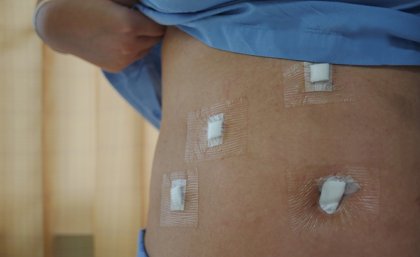Q&A: What happens when you discover unexpected results in research
In a long and distinguished career, QCGC Research’s head of research Professor Andreas Obermair has never once had to deliver unexpected results for a clinical research trial – until LACC. Here he explains the value of the unexpected.
Q: How did you react when you heard there were unexpected results for the LACC trial?
A: I was shocked and deeply concerned. I am a researcher, but I’m also human. As a trial leader, I have to be ‘blinded’ to the outcomes while the team conducts the trial so that I don’t influence the results. So, this made the news about LACC even more difficult to comprehend. It was unexpected.
To get a clinical trial up and running, you demonstrate ‘equipoise’. That means you must justify that the proposed treatment, in this case, laparoscopic surgery for early-stage cervical cancer, is theoretically better and at least no worse than the alternative. You can’t prove it, and that’s why you need to conduct the trial, but you have a sense of the likely outcome.
Q: How did the LACC trial come about?
A: QCGC Research had shown the benefits of a laparoscopic approach with the LACE trial for endometrial cancer. We wanted to investigate if the same was true for cervical cancer. We had an international team that thoroughly reviewed the literature and prepared the protocols. The trial involved 33 gynaecological oncology centres in 14 countries and enrolled 631 women. We expected, and of course, would have preferred different results.
Q: What happened after you realised there was a problem?
A: Based on the recommendation of the LACC Safety Committee, we called for trial recruitment to be placed on hold. The trial team then began an intensive review of the results. At this stage, although I had no visibility of the problem, I could see that the issue was serious and immediate action needed to be taken for the safety of future patients. During a three-month period, the trial team did every check required to make sure there was no way to misinterpret the data. All due diligence was done.
I would like to make special mention of the critical role that the independent data safety committee played in alerting the trial team about a patient safety issue. The committee’s role is to ensure the safety of all patients on the trial. The LACC Safety Committee absolutely fulfilled this role and acted in the best interests of trial patients.
Q: Did the review find a mistake?
A: No unfortunately, as the review results came in, it was clear there was no mistake. Laparoscopic surgery was not the best treatment option for early-stage cervical cancer. In fact, the research showed survival outcomes were worse. We had to share the news quickly with the community and empower as many women as we could with this new and vital information.
Q: As a researcher, what’s it like to explain that your original assessment was wrong?
A: It was very difficult to do, and many medical professionals reacted with anger. But I’m such a fierce proponent of laparoscopic surgery that people took notice – here I was telling them that for early-stage cervical cancer, this approach was not the answer.
Although it is not what we expected or hoped, this result is critically important. It shows yet again that clinical trials are irreplaceable. You cannot get high-quality evidence any other way. To write the textbook for gynaecological cancer treatment, you must conduct clinical trials.
Q: Do unexpected research results lead to other innovations and discoveries?
A: Yes, for sure. In the LACE trial, we learnt that even with laparoscopic surgery for endometrial cancer, obese women do not do well. This led us to the FeMMe trial where we are investigating a kinder and more effective treatment for these women.
Also, during LACE, we established that although laparoscopic surgery was the preferred treatment option, surgeons weren’t using it. That lead to the LIgHT study, which showed surgeons needed greater training support.
Q: If LACC needs further studies to understand the results, will you take it on?
A: After a decade of LACC, we will still be writing up the manuscripts for another five years. Someone else may take up further research related to LACC, but my energy is focused on two potential trials for different gynaecological cancers. The first is a follow-up to FeMMe and the second is about the role of sentinel nodes in the treatment of uterine cancer. I will never walk away from research – it is my opportunity to make a real difference.

